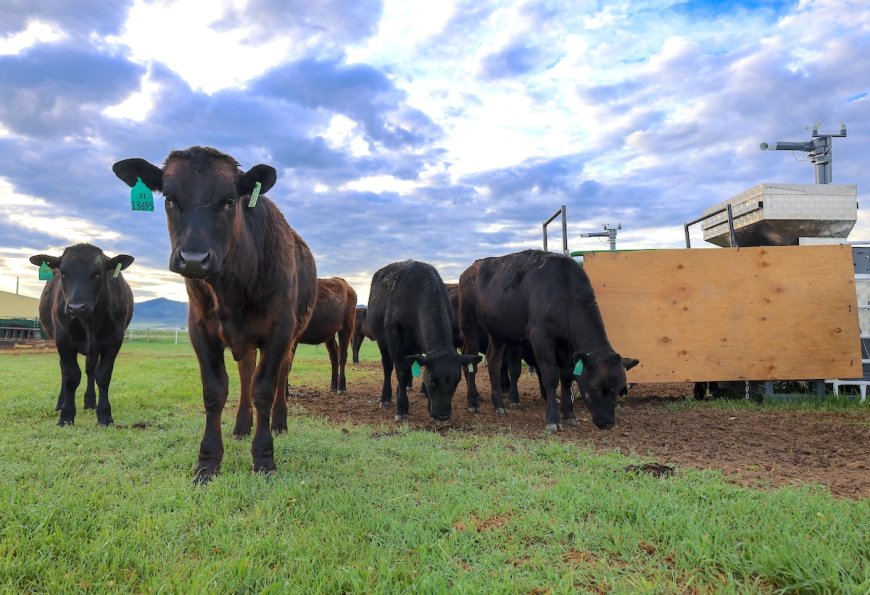Feeding Grazing Cattle Seaweed Supplements Reduces Methane Emissions by Nearly 40%, Study Finds
New research by scientists at University of California, Davis (UC Davis), has found that giving grazing cattle a seaweed supplement reduces their methane emissions by nearly 40 percent without having an effect on their health or weight. It is the first study to examine seaweed’s methane-reduction potential on grazing beef cattle, a press release from […] The post Feeding Grazing Cattle Seaweed Supplements Reduces Methane Emissions by Nearly 40%, Study Finds appeared first on EcoWatch.

New research by scientists at University of California, Davis (UC Davis), has found that giving grazing cattle a seaweed supplement reduces their methane emissions by nearly 40 percent without having an effect on their health or weight.
It is the first study to examine seaweed’s methane-reduction potential on grazing beef cattle, a press release from UC Davis said. Earlier studies had shown that seaweed could slash methane emissions by more than half in dairy cows and by 82 percent in feedlot cattle.
“Beef cattle spend only about three months in feedlots and spend most of their lives grazing on pasture and producing methane,” said the study’s senior author Ermias Kebreab, a professor in the Department of Animal Science at UC Davis, in the press release. “We need to make this seaweed additive or any feed additive more accessible to grazing cattle to make cattle farming more sustainable while meeting the global demand for meat.”
Livestock produce 12 percent of greenhouse gas emissions worldwide, with the largest proportion coming from methane produced by cow burps.
Because grazing cattle get more fiber from eating grass, they produce a greater amount of methane than dairy cows or feedlot cattle. There are more than 64 million beef cattle in the United States and nine million dairy cows.
Kebreab explained that the daily feeding of grazing cattle is harder than that of dairy or feedlot cows because they often spend long periods grazing far from ranches. During the winter months and when grass is scarce, however, ranchers frequently supplement their diet.
The research team divided 24 beef steers, which included a mix of Wagyu and Angus breeds, into two different groups: One was given the seaweed supplement, while the other was not. The 10-week experiment was conducted at a ranch located in Dillon, Montana.
The grazing cattle consumed the supplement voluntarily, which resulted in an almost 40 percent cut in methane emissions.
“This study suggests that the addition of pelleted bromoform-containing seaweed (Asparagopsis taxiformis) to the diet of grazing beef cattle can potentially reduce enteric methane (CH4) emissions (g/d) by an average of 37.7% without adversely impacting animal performance. Considering the substantial contribution of ruminant livestock to global greenhouse gas emissions, particularly CH4, a potent short-lived climate pollutant, this research offers a promising avenue for mitigating climate change,” the authors of the study wrote.
Most methane emissions-reduction studies using feed additives have been conducted using daily supplements in controlled environments. Kebreab pointed out that less than half of those measures are effective for grazing cows.
“This method paves the way to make a seaweed supplement easily available to grazing animals,” Kebreab said. “Ranchers could even introduce the seaweed through a lick block for their cattle.”
Kebreab said millions of people all over the world are supported by pastoral farming, including large grazing systems. These operations are frequently found in areas that are vulnerable to climate change. The study suggests a possible way to create more environmentally friendly grazing methods, while also helping mitigate global heating.
“The findings may be relevant in the context of growing global demand for livestock products and the urgent need to address the environmental impacts of animal source foods. Thus, this study contributes to the broader efforts aimed at developing more sustainable and environmentally friendly agricultural practices,” the study said.
The post Feeding Grazing Cattle Seaweed Supplements Reduces Methane Emissions by Nearly 40%, Study Finds appeared first on EcoWatch.
What's Your Reaction?








































